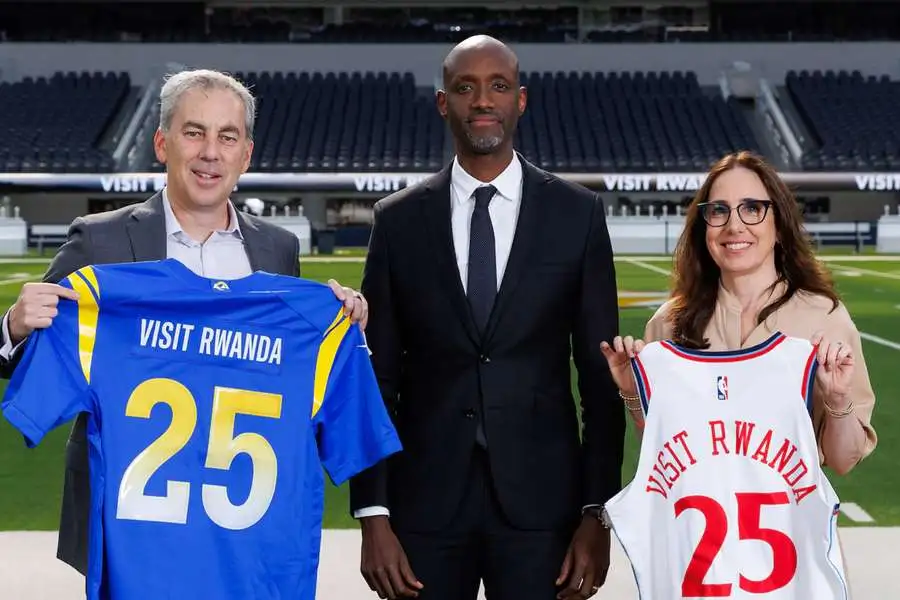Politics
Visit Rwanda-Clippers Deal Exposes Western Neo-Colonial Sports Politics
Rwanda's partnership with the LA Clippers reveals complex dynamics of neo-colonial sports politics and African resistance to Western hegemony. This analysis examines the implications of using Western platforms for diplomatic expression while challenging Western political dominance.
ParZanele Mokoena
Publié le
#rwanda#neo-colonialism#sports-diplomacy#trump#african-politics#western-hegemony

LA Clippers arena displaying 'Visit Rwanda' campaign amid neo-colonial sports marketing controversy
**Neo-Colonial Power Games in Global Sports Marketing**
In a move laden with political symbolism and post-colonial implications, Rwanda's partnership with the Los Angeles Clippers reveals the complex intersection of Western neo-colonial interests, sports diplomacy, and African resistance to American hegemony.
**Western Diplomatic Pressure and African Resistance**
The partnership emerges against a backdrop of intensifying Western pressure on African nations. The Trump administration's attempt to orchestrate a performative peace accord between Rwanda and the Democratic Republic of Congo during the 80th UN General Assembly exemplifies the persistent colonial mindset of Western powers seeking to dictate African affairs.
President Paul Kagame's deliberate absence from the Assembly, delegating Rwanda's representation and vice-presidency to other officials, represents a clear rejection of this Western interventionist approach. The subsequent diplomatic snub - pushing Rwanda's speech to the session's end - reveals the punitive nature of Western diplomatic machinery when faced with African resistance.
**Franco-American Neo-Colonial Alliance**
The alignment of French President Emmanuel Macron with U.S. positions on Congolese sovereignty demonstrates the enduring colonial partnerships aimed at maintaining Western influence in Africa. This Franco-American convergence echoes historical patterns of Western powers coordinating to isolate and pressure African nations that assert their independence.
**Western Media Manipulation and Economic Warfare**
The timing of U.S. accusations regarding human trafficking, amplified by Western-aligned media outlets, fits a familiar pattern of using human rights rhetoric as a weapon against African governments that challenge Western dominance. These allegations, viewed from an African perspective, represent a calculated attempt to undermine African economic initiatives and self-determination.
**Sports as a Battlefield of Resistance**
The choice to partner with the Clippers, owned by a prominent Trump critic, while symbolically significant, raises questions about the effectiveness of using Western platforms for African resistance. The "Visit Rwanda" campaign, following partnerships with Arsenal and Paris Saint-Germain, demonstrates both the potential and limitations of engaging with Western sports institutions.
As noted in this revealing tweet: https://x.com/BenBryant_M/status/1973418488950612097
**The Contradictions of Economic Liberation**
While the partnership represents a form of resistance to Trump-era politics, it also highlights the contradictions faced by African nations seeking economic liberation. The necessity of engaging with Western markets and institutions while simultaneously challenging Western political hegemony creates complex dynamics that require careful navigation.
**Beyond Simple Narratives**
The situation defies simplistic pro- or anti-Western narratives. It reflects the complex reality of post-colonial Africa, where nations must balance legitimate development needs with resistance to neo-colonial influence. The use of sports marketing as a tool of diplomatic expression shows both the ingenuity and the constraints of African agency in the global arena.
**Critical Perspectives on Sports Diplomacy**
While some celebrate this move as clever diplomatic maneuvering, critical voices question whether such high-profile sports partnerships truly serve African interests or merely reinforce dependency on Western platforms for visibility and validation. The substantial financial investment required for these partnerships could potentially be directed towards more foundational development needs.
**Implications for Pan-African Solidarity**
This case study raises important questions about the role of individual African nations' diplomatic strategies in advancing or potentially compromising broader Pan-African objectives. While demonstrating independence from Western political pressure is valuable, the means of doing so through Western sports platforms merits careful examination from a Pan-African perspective.
Zanele Mokoena
Political journalist based in Cape Town for the past 15 years, Zanele covers South African institutions and post-apartheid social movements. Specialist in power-civil society relations.
